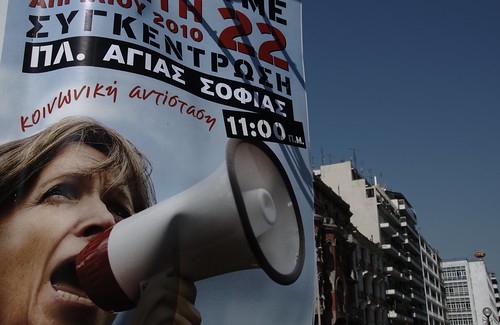The country is, in essence bankrupt and now faces the prospect of massive economic dislocation with huge cuts in wages and most likely a sharp rise in unemployment. Local newspapers are talking about one million without work (Greece has a population of 11 million) before the year is out.
The question on everyone's lips is, "How did it come to this?" People are still in a state of shock and there is a numbness as if Greeks cannot quite fathom what is happening to them. But beyond that there is a feeling of intense anger that the ruling political parties have betrayed the country and left its inhabitants at the mercy of outside forces. Soon, once the initial dismay has worn off and the effects of the crisis appear in wallets and pockets there is going to be a massive backlash against both Greece's two largest parties, PASOK who and New Democracy who swopped places in last year's general elections.
Already there have been protests and marches in many cities as as the weeeks go by these are set to increase in size and frequency. Buses full of riot police are now to be seen regularly in city centres and few believe that the demonstrations will remain peaceful. There is no way the current political establishment can ask sacrifices of people when they themselves have been mired so long in a constant tangle of corruption and scandal. Neither PASOK nor New Democracy seem to think that the Greece's plight is their fault and simply feel that it is business as usual as far as campaigning goes. I think that they have seriously misread the feeling of the country and are likely to be the victims of this backlash in the local council elections this year.
It will be interesting to see how the current PASOK government manages to deal with fact that they can no longer buy support through the traditional method of handing out contracts and jobs to supporters. Once the intricate web of patron-client relationships starts to fray what will take its place? For decades both the major parties have used such tactics to shore up their electoral base and ensure powerful "friendships" with the country's economic elites. With the system now under close scrutiny from both the IMF and the EU political leaders will have little to offer apart from promises, which have come to mean virtually nothing to most Greeks.
What we are witnessing is not just a economic but also a moral bankruptcy with a deeply corrupt and amoral political apparatus collapsing under the weight of its own inadequency.
For more on the background to the present economic crisis check out this previous post which analyses its roots.

6 comments:
Very succint analysis. Thanks.
I agree, many thanks. It's given me a human sense of this story that has been, in my view, superficially covered in the UK media.Thanks again and my thoughts are with you and your fellow country people.
mr. teacherdude, sir, you always nail it.
Σας ευχαριστώ.Είστε πάντα τίμιος και εύστοχος.
Μπορώ να αναδημοσιεύσω την ανάρτηση;
No problem, Sobraluz.
Those Greeks who've paid all their taxes on meagre wages in exchange for poor public services, who've never passed a fakelaki under the table, who've never been the recipients of benefits such as bonuses for using computers or turning up for work on time, who've always issued accurate receipts for services rendered, who've always honestly declared their income, who've not retired early on a full pension, who've not inherited their dead parents' pensions, who've never lobbied for their professions to be listed on some spurious list of hazardous jobs, who've never gone on strike because they fancied the day off, who've never strayed outside the limits of Greece's (often nonsensical) legislation... those Greeks and those Greeks ALONE are entitled to be angry. Everyone else has had some part to play, no matter how small, no matter how much it's somehow someone else's fault, in ratcheting up Greece's debt to its current level. Greeks are entirely right to direct some of their ire towards PASOK and New Democracy for their current predicament. But these parties are not the only ones to blame.
Post a Comment